May 23, 2025 | 20:37 GMT +7
May 23, 2025 | 20:37 GMT +7
Hotline: 0913.378.918
May 23, 2025 | 20:37 GMT +7
Hotline: 0913.378.918
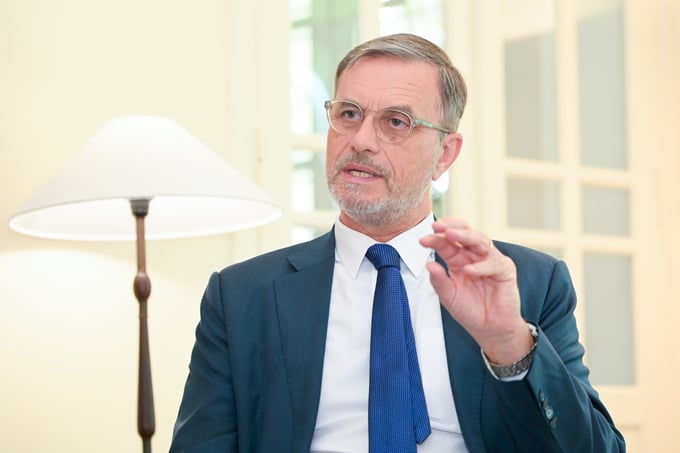
French Ambassador to Vietnam Olivier Brochet shares about agricultural cooperation between the two countries. Photo: Tung Dinh.
The Francophone Parliamentary Forum on sustainable agriculture, food security, and resilience to climate change is scheduled to take place in Can Tho from January 21-24, 2025. French Ambassador to Vietnam Olivier Brochet affirmed his delight to see this event launched just a few weeks following the Francophone Summit, which is held in Brazil.
The Ambassador asserts that the event serves as a demonstration of Vietnam's dedication and consideration for the Francophone community. Furthermore, the forum's content is pertinent and significant, as it is essential for all countries to promote the resilience of agriculture to climate change.
"This challenge is shared by all member countries of the Francophone community, despite the fact that the specifics may vary. Therefore, this is a critical moment for Francophone parliaments to implement legislation that not only enhances the resilience of agriculture to climate change but also guarantees food security", Ambassador Olivier Brochet underscored.
Ambassador Brochet also emphasized the necessity of modifying agricultural production practices, as agriculture is a substantial contributor to carbon emissions, which are contributing to the increasingly intricate issue of climate change.
Solidarity is one of the fundamental principles of the Francophone community, as per Ambassador Brochet. The collaboration of scientists in the research and development of solutions to address climate change is the initial manifestation of this solidarity. Additionally, it is illustrated by the sharing of research results during training sessions to collectively improve the capacity to address climate change.
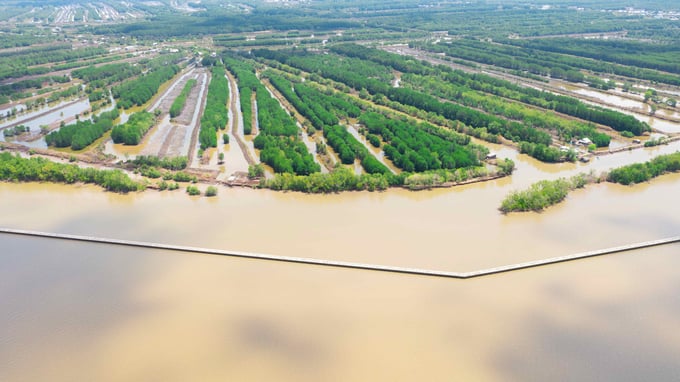
AFD-funded mangrove rehabilitation project in Ca Mau. Photo: AFD.
"I believe this is an extremely important issue, and the upcoming forum in Can Tho will provide an opportunity for Francophone countries to share and exchange results related to sustainable agriculture, food security, and climate change adaptation," the French Ambassador to Vietnam stated further.
Ambassador Olivier Brochet reported that at least two agricultural projects have been executed in relation to the cooperation between the two nations on this matter. European scientists are collaborating with Vietnamese scientists in the Mekong Delta to develop pilot models for climate change adaptation before scaling them up. This initiative is being led by the European Union.
The second initiative, which is being led by the French Space Research Center in the Mekong Delta, is focused on the analysis of satellite imagery to improve rice production. Scientists can gain insight into the irrigation mechanisms of rice by conducting these analyses. They will subsequently implement a production protocol that reduces carbon emissions.
This past October, Vietnam and over 30 partners, including France, signed a cooperation agreement under the framework of the Food Systems Transformation Partnership.
Ambassador Olivier Brochet also acknowledged that Vietnam and France are partners in the "One Health" initiative, stating that bilateral cooperation between our two countries is also a component of this partnership. This establishes a basis for collaborative research on production processes, which extends from the production of food and animal products to the consumption stage.
"We recognize that the health of humans is becoming more closely associated with the sources of food." He also stated that this partnership allows us to adopt a prevailing approach at the regional level, as opposed to acting independently as individual countries.
Ambassador Brochet praised Vietnam's agricultural advancements over the past four decades, which have converted the country from a food-insecure nation to one of the world's top exporters. Nevertheless, he also emphasized the contemporary obstacles that Vietnam is confronted with.
He emphasized that the agricultural production models of the past have certain limitations and must be promptly reformed. This necessitates bilateral and multilateral collaboration, as stated in the agreements previously mentioned.
Ambassador Brochet underlined that France is prepared to provide its technological expertise and support to help with Vietnam's vision and initiatives to establish sustainable agriculture. He emphasized that cooperative projects between the two countries are "highly practical," even when they do not entail complex technologies or substantial investments.
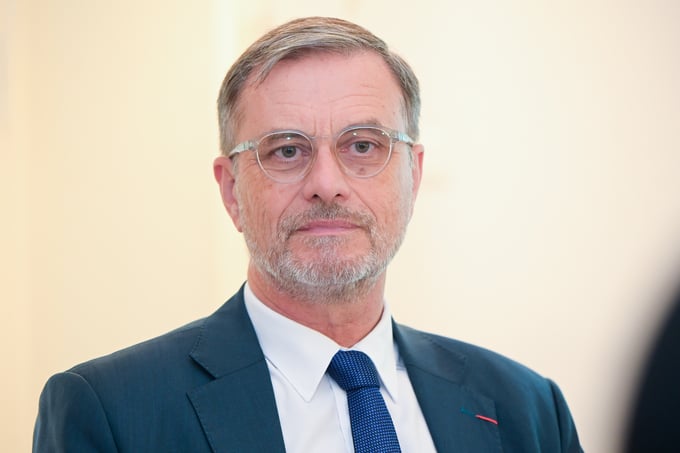
French Ambassador to Vietnam Olivier Brochet affirmed the readiness to accompany Vietnam in adapting to climate change. Photo: Tung Dinh.
"For example, an innovative aquaculture technique was introduced during a research project in Ca Mau that was conducted over the past four years. When implemented in 15 pilot models with very modest costs, it reduced ecosystem impacts by 90% while simultaneously increasing shrimp yields,” the French Ambassador to Vietnam shared.
This indicates that substantial financial resources are not always required. On the other hand, the commitment of scientists and the effective engagement and training of local communities can produce substantial outcomes.
Ambassador Brochet observed that extreme weather events are becoming more frequent and increasingly normalized, citing examples of severe storms that have affected both Vietnam and France in the past year. This emphasizes the pressing necessity for nations to acknowledge the significance of reducing emissions and mitigating climate change.
Vietnam has implemented numerous initiatives to improve its resilience, as it is one of the ten countries that have been most significantly impacted by climate change. In this context, the French Embassy in Vietnam and pertinent agencies will continue to provide assistance to Vietnam, particularly through the French Development Agency (AFD), which is currently executing successful projects in numerous regions, such as Ca Mau and Dien Bien.
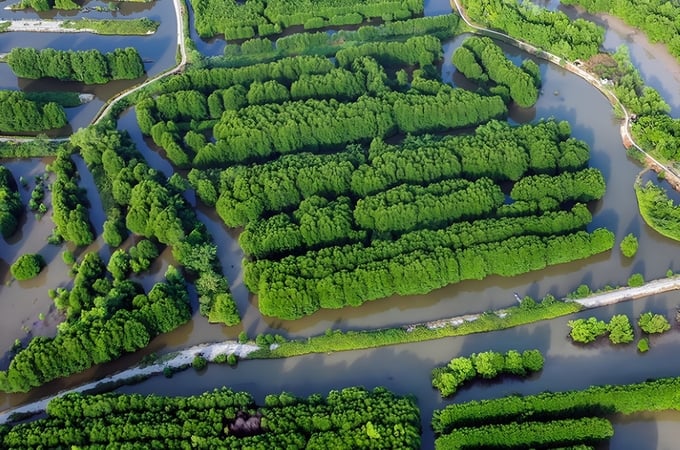
To date, AFD has implemented projects in 21 localities in Vietnam. Photo: AFD.
The French Development Agency (AFD) is engaged in Vietnam for more than three decades, and all of its initiatives are climate-related currently. Activities that are designed to improve adaptation and resilience to climate change are funded and supported by AFD.
Over its three decades of cooperation with Vietnam, AFD has implemented projects in 21 provinces and cities. Local authorities have been closely involved in the implementation of these initiatives, which has enabled the identification of practical needs at the grassroots level. Additionally, the technology transfer and training processes have been exceedingly successful. Many initiatives are effectively sustained and maintained by local governments and communities for an extended period of time, even after their official completion.
The spirit of Vietnam-France cooperation in AFD initiatives is embodied by the transfer of knowledge and techniques to local entities, which enables them to operate efficiently and sustainably, according to Ambassador Olivier Brochet.
Translated by Linh Linh

(VAN) WWF, GIZ, IUCN, UNDP call for biodiversity conservation and sustainable development must be regarded as a unity in strategies for a green future.

(VAN) On celebration of International Day for Biological Diversity, Deputy Minister Nguyen Quoc Tri called for practical actions to address nature and biodiversity conservation.

(VAN) Dr. Hoang Thi Thanh Nhan – Deputy Director of the Nature and Biodiversity Conservation Agency – highlighted this on the International Day for Biological Diversity, May 22, 2025.
![Ho Chi Minh city adapts to climate change: [2] Accelerating action](https://t.ex-cdn.com/nongnghiepmoitruong.vn/608w/files/chiqk/2025/05/22/4024-4220-bien-doi-khi-hau-1-100626_766.jpg)
(VAN) Clearly recognizing the challenges posed by climate change, Ho Chi Minh city has swiftly shaped its policies and implemented practical solutions to adapt.

(VAN) Rice straw is no longer just a discarded byproduct, but it is becoming a green resource that helps farmers in the Mekong Delta reduce emissions and promote circular, sustainable agriculture.

(VAN) Other Effective Area-based Conservation Measures (OECMs) are solutions that contribute effectively to achieving the goals of the Kunming–Montreal Global Biodiversity Framework.
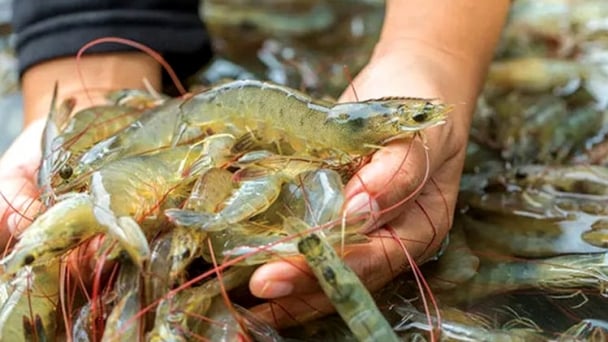
(VAN) A study assessing the carbon footprint of whiteleg shrimp farming in China shows the potential for carbon emission reduction through the use of renewable energy.